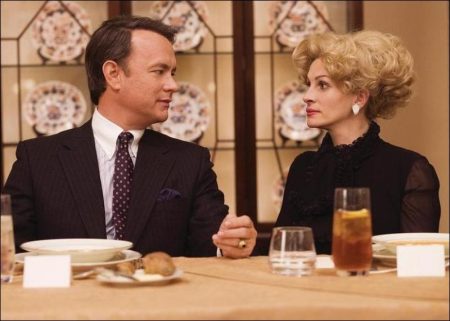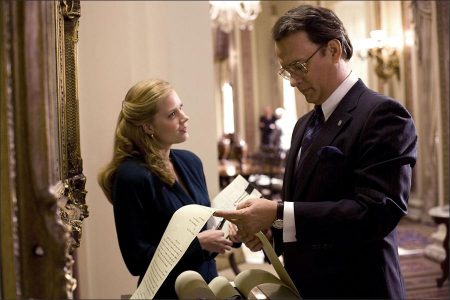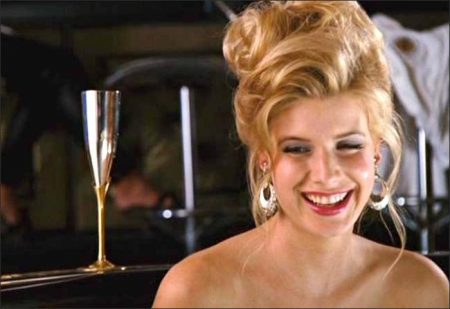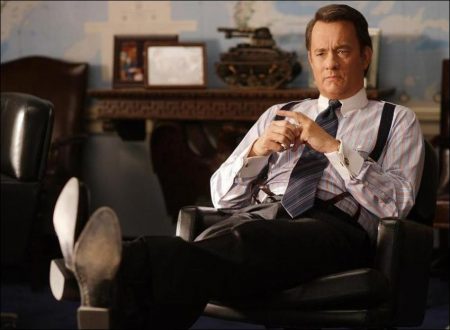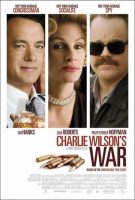Charlie Wilson’s War Movie Trailer. By 1979, Congressman Charlie Wilson had, in peerless fashion, represented Texas’ 2nd District for six years. “The liberal from Lufkin” was a paradox who routinely championed the disempowered. He battled for women’s rights and seniors’ tax exemptions, but the native Texan also opposed gun control. His black constituents were his biggest supporters; he was pro-choice in the Bible Belt. His district loved him.
On Capitol Hill, Wilson was perhaps better known for the personal foibles that accompanied his growing political capital. He surrounded himself with a bevy of beautiful assistants, dubbed, naturally, “The Angels.” With his 6’4” frame, booming voice, quick wit and infinite charm, he had a way with the ladies helped by a love of the whiskey. Scandal seemed to follow him everywhere, but as he was so affable, Wilson always managed to dodge any damage. And of all the events occurring in 1979, the Soviet invasion of Afghanistan seemed least likely to appear on his radar. Then again, nothing Wilson did could ever be described as likely.
The public revelation of Wilson’s extraordinary exploits began with a 60 Minutes profile produced by award-winning journalist George Crile in 1988. Crile continued to follow the story and wrote a best-selling book about Wilson’s covert war that read like a novel, except it wasn’t fiction. As Crile noted in his book, “It was January of 1989, just as the Red Army was preparing to withdraw its soldiers from Afghanistan, when Charlie Wilson called to invite me to join him on a fact-finding tour of the Middle East. I had produced a 60 Minutes profile of Wilson several months earlier and had no intention of digging further into his role in the Afghan war. But I quickly accepted the invitation. The trip began in Kuwait, moved to Saddam Hussein’s Iraq, and then to Saudi Arabia-a grand tour that took us all to three of the countries that would soon take center stage in the Gulf War. For me, the trip was just the beginning of a decade-long odyssey.”
Wilson’s outrageous tale of international intrigue and global politicking, cast with colorful characters who dreamed of glory, captivated the veteran reporter. It also proved to be an extraordinary challenge to document the confounding saga of Muslim fundamentalists, Jewish arms dealers and CIA agents working in tandem with two Texans and a Greek-American CIA agent.
Crile’s wife, publisher Susan Lyne, explains: “No one involved knew the whole story. Charlie knew his part; Gust his, Joanne hers. George interviewed Charlie and Gust many times over many years and as they learned to trust him, they gave up a little more each time. George had to put all the pieces together and then find a narrative arc that would invest the reader in the characters and the outcome.”
Obtaining and deciphering the material was a monumental task, especially since Crile never quit his day job. “The time it took seems ridiculous [13 years from that first trip to publication], but he was unraveling secret deals with countries that don’t even acknowledge each other, CIA covert ops and the inner workings of congressional committees,” Lyne recalls.
Her sister, Barbara, became Crile’s cheerleader and sometime gadfly-supporting, editing and otherwise urging him to finish the book. She was so instrumental to his process that he dedicated the book to her.
“I think what intrigued him was that this was such an American story, with fallible characters who-underneath the gruffness and drinking and womanizing-had dreams of glory,” Barbara Lyne explains. “They responded to these underdogs, the Afghan Mujahideen, and believed they could make a difference in the world. Lots of people have dreams of glory, but, occasionally, the stars align just right and three or four people come together and something huge blossoms. George loved redemption stories, and loved this one particularly, because the heroes were so unlikely. He liked the fact that, as the Afghans would tell you, `Allah works in mysterious ways.’ The Americans who participated were all outsiders and misfits who didn’t belong in this arena, but they took risks and guessed right.”
When Crile’s book finally debuted in 2003, it became a best seller and attracted attention from Hollywood. Producer Gary Goetzman first heard of the book through a Washington connection. “A congressman whom I am very fond of told me about Charlie Wilson and what a fascinating character he was,” Goetzman recalls.
Goetzman and his producing partner, Tom Hanks, did just that. Upon reading “Charlie Wilson’s War,” they became fascinated with the rollicking tale, especially the inner workings of D.C. and the Afghan resistance to the Russian Army documented by Crile. “It was a great political story that was also wildly entertaining and absolutely unique,” Goetzman says. “Charlie was so impressed by what these Mujahideen went through to get the Soviet Union out of their country. The way he went about helping was outrageous, mesmerizing and funny.”
“We took one look at that book and pounced on it,” Hanks adds. “It read like a house on fire.” The actor / producer was most dumbfounded by the fact that, “like every other American, I thought it was a great thing that this ragtag group of Afghans defeated the Russian Army. I thought it was a miracle and it took a long time; what a brave bunch of patriots they were. I had no idea about the covert aspects, or that the money was coming in from the United States and other countries to arm them-money out of our own Congress, signed off by the White House.”
After Goetzman and Hanks won over Crile, the task of translating his tome into a screenplay went to Emmy Award-winning writer Aaron Sorkin, known for political stories full of intelligent characters, witty wordplay and engaging plots. From A Few Good Men (the play and the film) to The American President and the highly regarded series The West Wing, Sorkin has deftly navigated the echelons of American power, from the military to the Beltway-the stomping grounds of Wilson.
“I read a review of the book, and I went out and bought it,” remembers Sorkin. I’d read the first 50 pages when I saw in the trades that Playtone had bought the film rights. I asked my agent if he could get me a meeting with Gary Goetzman so that I could try to convince him that I might be the right screenwriter to adapt it.” He adds, “Gary, in a rare display of poor judgment, hired me.”
Sorkin’s next challenge was to distill Crile’s intricately detailed book into a script. To find just the tone, the writer would spend months researching the world Crile had meticulously documented. “It took me about eight months to complete a first draft,” he states. “The book is essentially a series of very detailed, in-depth interviews, and it doesn’t immediately present itself as a movie. Screenplays are usually written in three acts, but, after a lot of climbing the walls, a five-act structure came to me.”
The screenwriter met with Crile several times during this process, and the journalist made his research available to Sorkin. In preparation, Sorkin also spent time with Wilson, who would become a regular contributor throughout the production. Wilson proved to be every bit the gentleman and frequently offered his sharp intellect, wicked sense of humor and keen knowledge of history.
The congressman was open to Sorkin’s interpretation: “Anybody who reads a script about himself for the first time will have some reservations; you think that some of your most heroic deeds have been left out,” Wilson says. “But you grow to realize that only so much can be put in, that no movie can have all of the scenes that a book or even a life does. I accepted that early on.”
Commends Goetzman: “From the first day I talked to Charlie on the phone, I thought this was the funniest, warmest, savviest straight shooter that I’d ever talked to regarding a movie. He never let us down, solid as a rock-always there understanding the process more than he should.”
The producers worked with Sorkin to translate Crile’s story into screenplay form, while honoring the basic truths of what Charlie, Joanne and Gust accomplished. “That’s the trick,” offers Hanks. “You’re not going to be able to get the kitchen sink. Charlie Wilson’s War could be a fascinating documentary. But, as a piece of entertainment with historical aspects that are going to be interpreted, you get an artistic aesthetic that requires perspective. All that is drawn from the book and includes conclusions from the entire creative team, but it started with Aaron’s screenplay and matches up to the sensibility of George’s book.”
When Playtone and Sorkin were satisfied with the draft, the producers approached filmmaker Mike Nichols about directing the project. Nichols, whose career spans more than four decades of stage, screen and television, has explored the lives and loves of a variety of memorable characters, revealing them through humor, intelligence and sensitivity. “We felt that this was the kind of material that might attract Mike,” notes Goetzman. “Political intrigue, coupled with a character like Charlie, whose exploits were not just astonishing, but always entertaining. Charlie and his partner-in-crime, Gust, were great foils, completely different personalities; together they are smart and funny, unbelievably captivating…Joanne Herring, who was glamorous, sexy and stubbornly single-minded-all that makes for great human drama. And comedy often comes out of the most singular and mind-boggling circumstances-the kind of material made for Mike.”
Longtime friends Nichols and Hanks had come close to doing a picture together, but nothing came to fruition until Charlie Wilson’s War. The double Oscar winner commends he’s been influenced by his director’s work since his early acting days. “I know where I was and what I was going through when I saw Mike’s films, from Catch-22 to The Graduate to Who’s Afraid of Virginia Woolf?” reflects Hanks
For Nichols, the project began with a simple discussion. “Tom and Gary wanted me to read the book,” he says. “Of course, I loved the book and was very interested. The idea of Aaron Sorkin seemed to be brilliant and correct. Tom and I were good friends, and I always wanted to work with him. And then, of course, he was better than I could have imagined.”
The director next met with Wilson, and he was mesmerized by the statesman. “He owns the room, and he is the only politician I’ve met who isn’t at least partly prerecorded,” Nichols states. “He listens to you, and he answers with whatever comes into his head. He’s courtly and kind and thoughtful; he truly loves people.”
Not only Wilson’s self-effacing, bold honesty, but also his story of “three people who brought down a giant empire” impressed the director. Nichols clarifies, “They had a lot of open help from the people whom they inflamed. But, basically, among the three of them, they got the things started that caused the fall of the Soviet Empire.
“A lot of people don’t know how serious the Cold War was, how terrified everyone was of Russia, how it was a fact,” Nichols continues. “It wasn’t a guess about weapons of mass destruction; they had them. The Cuban Missile Crisis was sheer terror, because the Russians could have unleashed them on us. As Charlie says, these things really happened, and it’s very hard to grasp that there was one bad guy and it was Russia. All over the world, everybody was terrified of them.”
To prepare for the role, Hanks huddled with Wilson (who would prove an invaluable consultant on the project) to discuss everything from politics, Herring and Avrakotos to his often outrageous personality. The former congressman proved quite candid and gracious, giving very specific character notes-which seldom bathed him in a perfect light, but reflected his feats as well as his foibles.
Provides Hanks: “I said, `Okay, you’ve got a guy running against you for your seat in Congress. You’ve been investigated for doing drugs. You’re known as a ladies’ man. You’re notorious for your drinking, your carousing and your partying. What do you say in the campaign against the guy who wants to get Good Time Charlie?’ He said, `The opposition could say whatever he wanted to say about me, but we passed more Medicare bills, we took care of our veterans better than anyone else, we brought home this bill and that bill.’ He was the consummate politician, but he was never hypocritical about his behavior. Plus, he is an impressive physical specimen. He’s very tall; he’s got a massive voice, all that Texas stuff-from the cowboy boots to the belt buckles and suspenders-and he’s also incredibly charming.”
Continues Hanks, “He had already invested a lot of time and heart into the book with George. On some level, he was accustomed to another person asking him about the finer points of his life. What was amazing, to Charlie’s credit, was that he said, `I don’t care what you say about me. Show me doing anything you want to because, chances are, I did it. It’s the historical record that I want to be dealt with accurately.’ He took us to task about that over and over, but he didn’t care if we showed him in a hot tub in Las Vegas with a bunch of exotic dancers…because he did it.”
Sadly, author George Crile did not live to see the film begin production. He died of pancreatic cancer on May 15, 2006, at age 61. “We lost George Crile before we started shooting,” reflects Goetzman. “His writing the book, his love of Charlie was such a big part of his life, and one of the greatest things for him was this movie getting made. To lose him before shooting was really tough.”
Charlie Wilson’s War (2007)
Directed by: Mike Nichols
Starring: Tom Hanks, Julia Roberts, Phillip Seymour Hoffman, Amy Adams, Om Puri, Jud Tylor, Nazanin Boniadi, Hilary Angelo, Cyia Batten, Emily Blunt, Daniel Eric Gold
Screenplay by: Aaron Sorkin
Production Design by: Victor Kempster
Cinematography by: Stephen Goldblatt
Film Editing by: John Bloom, Antonia Van Drimmelen
Costume Design by: Albert Wolsky
Set Decoration by: Nancy Haigh
Art Direction by: Brad Ricker
Music by: James Newton Howard
MPAA Rating: R for strong language, nudity/sexual content and some drug use.
Distributed by: Universal Pictures
Release Date: December 21, 2007
Views: 201
